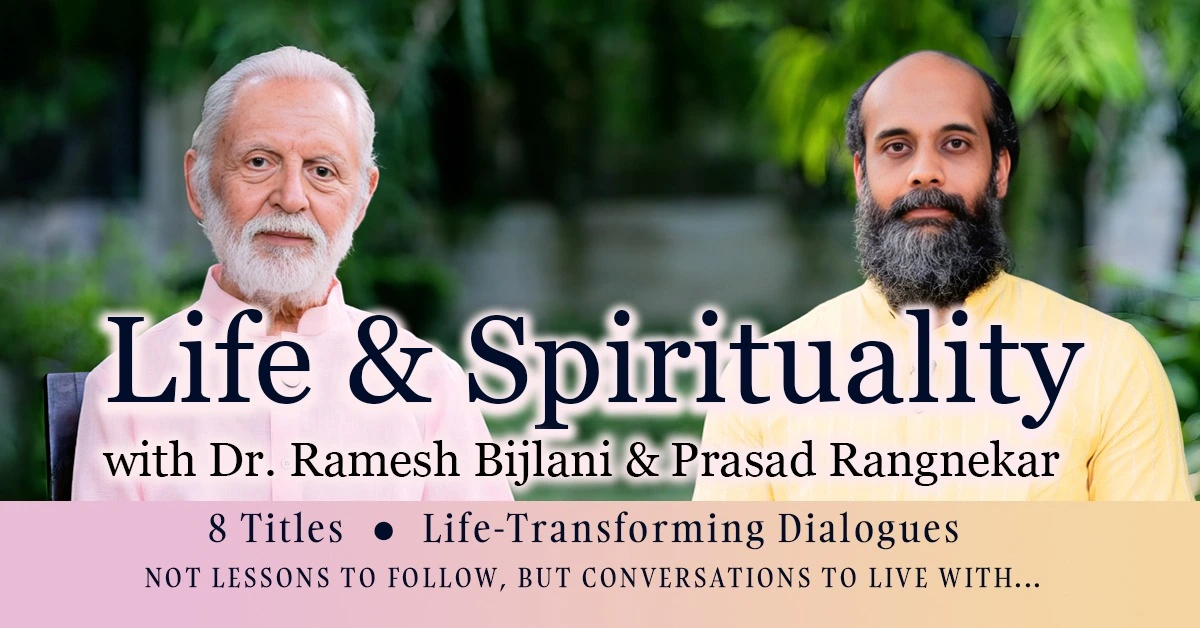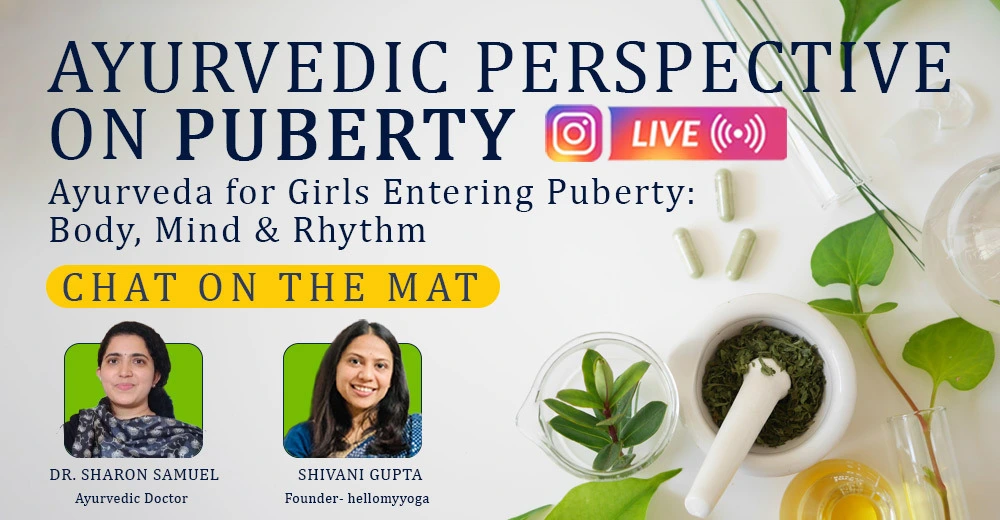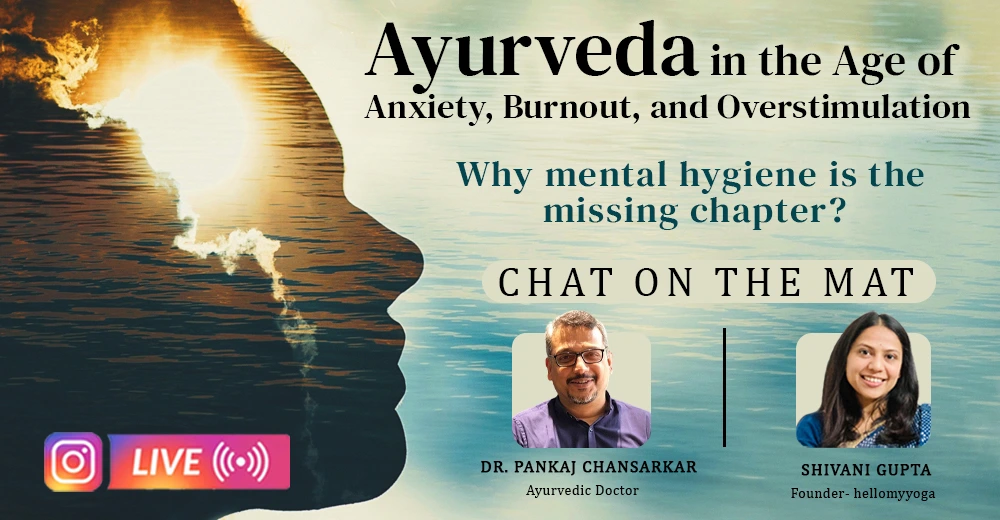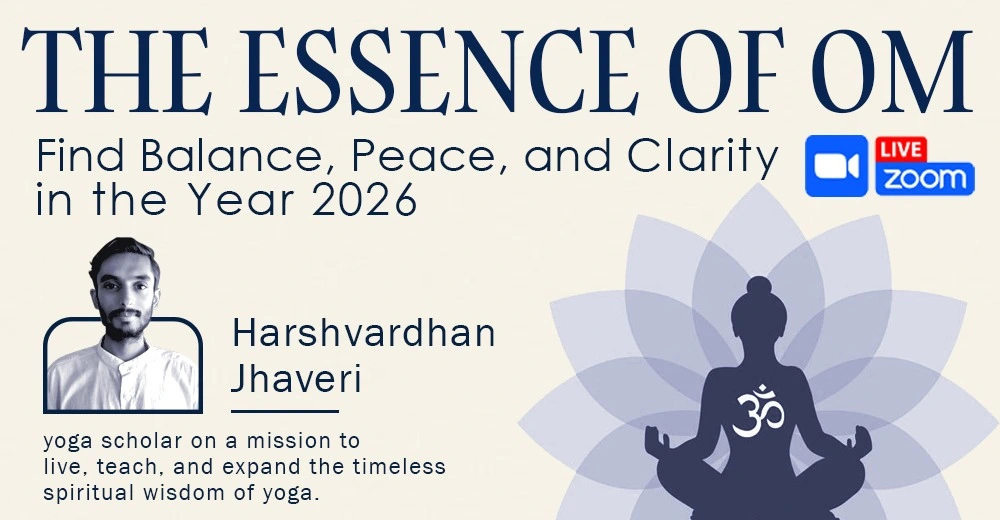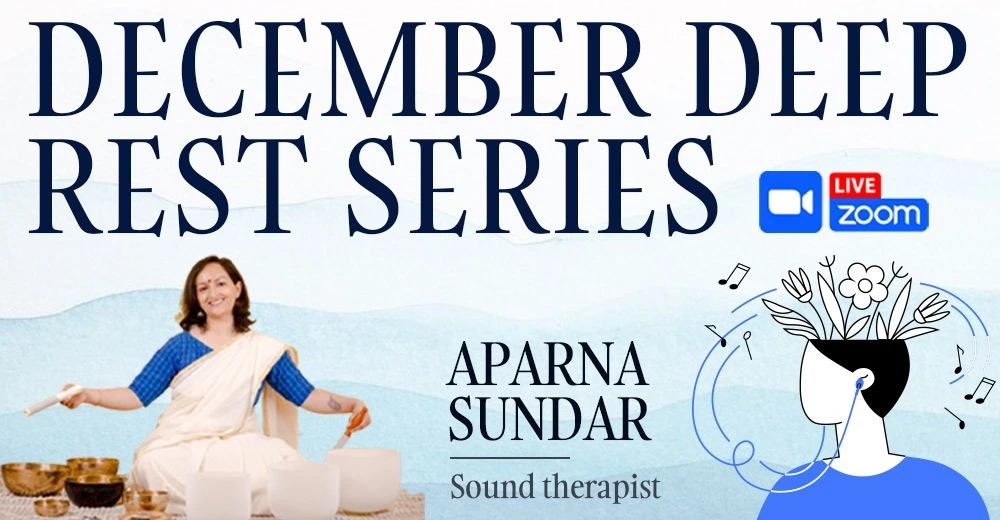Online Mental Health Courses & Programs
Manage your mental health with our mental health courses curated by qualified and experienced yoga gurus. We help you find inner peace and true happiness through the most calming and effective yoga for mental health course.

Invest in Yourself: Join Authentic Mental Health Courses in India
hellomyyoga is your trusted source for the online course on mental health and overall well-being


About hellomyyoga
Offering Purposeful & Transformational Yoga Courses Online

Our vision at hellomyyoga is to make the power of ancient yogic sciences accessible to everyone and to help them reach their full potential by creating a supportive and inclusive space to learn, grow, and find fulfillment.
We strive to empower individuals to improve their mental, physical, environmental, and spiritual well-being, and to promote awareness and connection with the wider global community.
Our online yoga and wellness courses provide pathways to self-discovery and meaningful growth, making us proud to have earned the support and trust of 77+ countries!
As a company, we are committed to providing high-quality, accessible, and engaging online yoga courses, while offering a safe and welcoming space for people to connect, learn, and grow.
Why Choose Us for Online Course on Mental Health?
Experienced Yoga Gurus
All our online programs on yoga for mental health are led by leading and experienced yoga practitioners who have invested years learning the practice and implemented it in their lives.
Globally-accessible Programs
hellomyyoga offers a global platform where people from different countries can come to attend our mental health yoga training. Our online sessions are accessible from anywhere in the world.
Upskill Yourself
Our mental health training course is designed to help fitness coaches, yoga trainers, instructors, and practitioners upskill themselves so they can deal with their audiences more efficiently.
Balanced and Happy Lifestyle
We have designed mental health courses that aim to improve your mental, emotional, and physical health. It helps clients get rid of stress and ensures a balanced lifestyle.
Personalised Yoga Experience
Our yoga trainers give personal attention to each client, working closely with them to make sure they meet their specific goals. There are no set rules to start the course, but we help you find what you seek.
Based on Years of Practice
Our mental health yoga trainers focus on anubhutis, a Hindi term for ‘a self-contained phenomenal experience’. They have curated programs based on their in-depth research and real-life implementation.
The data you are looking for is not available.
FAQs Related to Mental Health Course & Program
Mental health comprises the psychological, emotional, and social well-being of a human being. It affects our thoughts, emotions, feelings, and actions. Moreover, it is our mental health that determines how we handle stress and make important life decisions.
It is critical at every stage of our lives, from childhood to adolescence to older age, as it has a huge impact on our relationships and physical health. Taking care of your mental health involves balancing life responsibilities, activities, and efforts to attain psychological resilience.
If you want to live a happy, peaceful, and fulfilling life, you need to practice yoga daily and start appreciating its benefits. Many yoga practices focus on our mind and how we engage it. For instance, Bhagavad Gita chanting, Om chanting, Patanjali yoga sutra philosophy, and mantra meditation are proven to be effective for mental health improvement.
Yoga is a form of low-impact exercise and brings down stress hormones in your body. It also increases beneficial brain chemicals, such as GABA and endorphins. These feel-good chemicals help decrease stress and anxiety while improving mood.
The relaxation techniques included in yoga can help treat various mental conditions. Regular yoga practice benefits an individual in the following ways:
Improved sleep cycle and quality
Reduced anxiety and stress
Improved energy
Less or no negative thoughts
Better balance of mind and body
Positive attitude toward life and situations.
Yoga therapy uses the same techniques and tools as yoga but with a main focus on individual needs. It promotes emotional balance and helps with mood regulation.
Mental health yoga therapy is used to treat depression, anxiety, insomnia, trauma, and other conditions. It also treats several physical health conditions, such as pain, mind-body connection, and various diseases.
Mental health has become more crucial than ever, and people are talking about it without hesitation as it affects every aspect of our lives. Today, around 450 million people worldwide suffer from mental disorders.
It is among the largest disease burden in the world, and treating it is beyond the capacities of even developed nations. Nurturing mental health improves daily functioning and combats many physical health issues linked to mental health, such as heart disease.
It also stabilises our emotions, behaviours, and thoughts while improving our productivity, relationships, and self-image.
Mental health is directly or indirectly linked to our behaviour and affects our overall health and quality of life. That’s where the role of best mental health courses comes into play.
Any type of mental disorder affects our basic behaviour, such as eating habits, sleep cycle, addiction, etc.
Depression and anxiety lead to vascular and heart diseases.
Poor mental health can diminish immune functioning.
Mental illness can also result in various social problems like broken families, drug abuse, unemployment, poverty, and related crimes.
Medically ill patients struggling with depression are at more risk than those without.
Yoga helps eliminate stress and negative thoughts by promoting relaxation. It benefits three key aspects of a person which are primarily affected by stress- mind, body, and breathing.
Practising slow rhythmic breathing yoga exercises every day induces a sense of well-being, mental focus, calm, and tolerance, reducing depression and stress. One doesn’t have to be stressed or suffer from depression to start practising yoga. Those who do even 15 minutes of yoga daily are able to handle their life problems better and can bring balance to their lives.
Certainly, yoga has proved to be effective and beneficial for mental health. Several studies have concluded it to be a great treatment to get rid of stress and anxiety. Even mental health experts recommend people practice yoga daily for at least 15-30 minutes to stay mentally healthy and happy.
The mental health course is a training program designed to educate individuals on various aspects of mental health, including common mental health disorders, treatment options, and ways to promote mental wellness. Our course also helps yoga instructors and trainers upskill themselves so they can treat several mental health conditions effectively and cater to their audiences’ demands.
Mental health courses can cover a variety of topics, including mental health disorders such as depression and anxiety, treatment options such as therapy, yoga, meditation, ways to promote mental wellness, and strategies for coping with stress and other mental health challenges.
Taking an online course on mental health can provide individuals with a better understanding of mental health issues, help reduce the stigma surrounding mental illness, and provide them with tools and strategies to promote mental wellness and support others who may be struggling with mental health challenges.
We have designed an extensive mental health training program for experienced yoga instructors and fitness coaches to help them improve their mental health knowledge and acquire skills to treat several conditions.
Yes, our mental health courses are available online, which can be a convenient and flexible option for you to attend from anywhere. You can join the sessions according to your schedule.
Yes, mental health is incredibly important. Mental health refers to our emotional, psychological, and social well-being, and it impacts how we think, feel, and behave. Good mental health is important for a variety of reasons, including:
Physical health: Mental health and physical health are closely interconnected, and poor mental health can lead to a range of physical health problems, including chronic pain, headaches, and digestive issues.
Relationships: Our mental health can impact our relationships with others, as it affects our ability to communicate, connect, and empathize with others.
Work and productivity: Good mental health is important for productivity and success in the workplace, as it affects our ability to focus, problem-solve, and manage stress.
Overall quality of life: Mental health plays a significant role in our overall quality of life, as it affects our ability to experience positive emotions, cope with challenges, and find meaning and purpose in life.
Prevention of mental illness: Prioritizing mental health and engaging in practices to promote mental wellness can help prevent the development of mental health disorders and improve overall mental health outcomes.
There are several common mental health issues that people may experience, including:
Depression: It is a mood disorder that can cause persistent feelings of sadness, hopelessness, and loss of interest in activities.
Anxiety disorders: These are a group of disorders that cause excessive fear, worry, and nervousness, and can interfere with daily activities.
Post-traumatic stress disorder (PTSD): It is a mental health condition that can develop after experiencing or witnessing a traumatic event, such as a natural disaster, combat, or physical assault.
Bipolar disorder: It is a mental health condition that can cause extreme mood swings, including episodes of mania and depression.
Obsessive-compulsive disorder (OCD): OCD is a mental health disorder that causes uncontrollable, recurring thoughts (obsessions) and/or repetitive behaviours (compulsions).
Schizophrenia: It is a mental health disorder that can cause a range of symptoms, including delusions, hallucinations, and disordered thinking.
Eating disorders: Eating disorders are a group of mental health disorders that involve unhealthy attitudes and behaviours related to food, weight, and body image.
It's important to note that mental health issues can vary widely in terms of severity, and duration, and impact on an individual's daily life. Seeking professional help and treatment is important for managing and improving mental health outcomes.
Mental health therapy is a form of treatment that helps individuals improve their mental health and well-being by addressing emotional, behavioural, and psychological challenges.
Therapy can take many forms, but some common types of mental health therapy include:
Cognitive-behavioral therapy (CBT): CBT is a type of therapy that focuses on identifying and changing negative thought patterns and behaviours that contribute to mental health challenges.
Psychoanalytic therapy: Psychoanalytic therapy is a type of therapy that focuses on exploring unconscious thoughts and emotions to gain insight into current behaviour and challenges.
Mindfulness-based therapy: It is a type of therapy that focuses on cultivating mindfulness and present-moment awareness to reduce stress and improve mental health.
Group therapy: Group therapy involves meeting with a therapist and other individuals with similar challenges to discuss and work through mental health issues together.
Family therapy: Family therapy involves meeting with a therapist as a family unit to address communication and relationship issues that may be contributing to mental health challenges.
Special Initiatives
Digital and real-world noise have caused us to become restless creatures of indecision. Our mind attaches to the ego, which causes us to misunderstand reality.
hellomyyoga has created special initiatives for people looking to live healthier lives. Our yoga courses and programs provide holistic knowledge to adopt a healthy lifestyle for better mental health and happy ageing.
hellomyyoga Categories
Yoga Programs
Explore expertly designed online yoga programs for all levels, including beginners, advanced practitioners, yoga teachers, and enthusiasts. Join now!
Bhagavad Gita Courses
Get into the heart of yogic philosophy with the online Bhagavad Gita courses by hellomyyoga.
Free Yoga Courses
Join our free yoga courses and programs 2023 and experience the physical, mental, and spiritual benefits of yoga from the comfort of your home. Join now!
Health Wellness Courses
Discover the best online health and wellness courses to transform your well-being. These courses offer expert guidance and practical knowledge. Join now!
Prenatal Yoga Courses
Discover the best prenatal yoga courses online for pregnant women. Stay fit and calm throughout your pregnancy with our prenatal yoga programs. Join now!
Yoga for Women
Discover the transformative power of yoga for women's health with our best online yoga courses & programs. Join now!
Ayurveda Courses
Discover the ancient wisdom of Ayurveda with our Ayurveda courses and programs. Learn from experienced practitioners and gain practical knowledge.
Online Meditation Courses
Discover inner peace and cultivate mindfulness with our guided online meditation courses. Join now and experience the benefits for yourself.
Yoga Therapy Courses
Our online yoga therapy courses are designed to help you manage pain and improve your overall well-being. Learn from expert teachers and transform your health.
Mental Health Courses
Take charge of your mental health with our top-rated online mental health courses and programs. Get started today and start feeling better tomorrow.
Yoga for Senior Citizens
Do you want to be active and fit in old age? Then join our specialised courses and programs of yoga for senior citizens, Get started now!
Emotional Intelligence Courses
Join our online emotional intelligence courses and programs and Learn how to regulate your emotions, enhance communication skills, resolve conflict and more.




